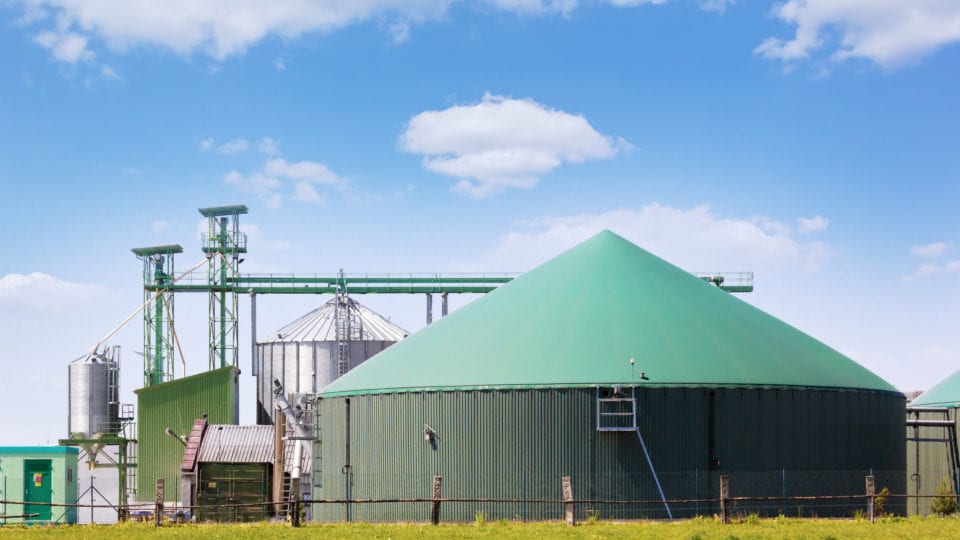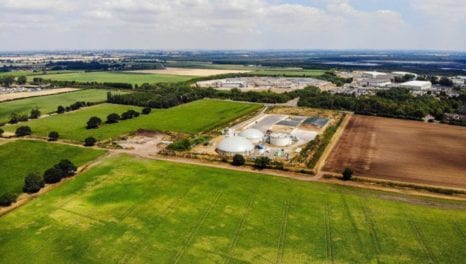UK set for surge in plants producing ‘green gas’
The UK is expected to see a big increase in biomethane plants with predictions of a 50% rise in the number operating by 2020.
15th October 2018 by Networks

The four gas distribution networks (GDNs) which manage the pipes these plants connect to – Cadent, SGN, Northern Gas Networks and Wales & West Utilities – are joining forces to facilitate this anticipated growth in a gas that uses the nation’s waste and other ‘feedstocks’ to make grid-quality biomethane.
These plants stop organic waste going to landfill, where it decays and produces gases more harmful to the environment than carbon [16 per cent of UK methane emissions come from manure management, for example]. Instead, it’s used to make gas that heats thousands of homes and power heavy goods vehicles.
In Cadent’s network area (covering North West England, the East of England, South Yorkshire, the Midlands and parts of the South East), the amount of biomethane currently entering distribution pipes meets demand for heating 114,000 homes – the equivalent demand from a city the size of Coventry.
However, these plants have the capacity to increase output to meet local demand (for example, in colder months), to volumes that would heat more than 190,000 homes. This is more than the supply needed to meet demand from a city the size of Liverpool or Manchester.
Tina Hawke, design manager and lead in this area for Cadent, the biggest UK gas network, and chair of the Energy Networks Association’s biomethane group, said: “The evidence is now pointing to fast growth for biomethane – we know there are around 50 applications for new plants going through the system.
“This will provide safe, sustainable gas supplies for homes and businesses for decades to come, and help to reduce the country’s greenhouse gas emissions.”
There are currently 48 applications now with Ofgem, for permission to operate new plants. This would take the number of UK plants from 98 to 146.
Charlotte Morton, chief executive of the Anaerobic Digestion & Bioresources Association, said: “The restoring of higher tariffs and introduction of tariff guarantees for the Renewable Heat Incentive will give the UK’s biomethane industry a much-needed boost.
“We are expecting as many as 50 new biomethane facilities to be built over the coming 18 months as a result of the changes, with an accompanying investment of £300-£400 million.”
Claire Perry, Minister for Energy and Clean Growth, said: “The UK has led the world in cutting emissions whilst growing our economy – with clean growth driving incredible innovation and creating hundreds of thousands of high quality jobs.
“Ten years on from the Climate Change Act, the first ever Green GB week is a time to build on our successes and explain the huge opportunities for business and young people of a cleaner economy.
“I’m delighted to see how many more businesses and organisations, such as Cadent, are seizing this multi-billion pound opportunity to energize their communities to tackle the very serious threat of climate change.”
Biomethane is made when biodegradable matter, such as food waste, sewage, manures, or energy crops, is fermented in anaerobic digesters. This produces gas which we can use to heat homes and power heavy goods vehicles.
No changes are needed to the UK’s existing gas pipe network, or domestic appliances, to accommodate expansion of this source of green gas. Customers would continue to use gas through the same pipes they have now.
Comments
Login on register to comment
Related content

Gas
Cadent backs launch of major bio-CNG HGV refuelling station
Gas network’s £250,000 infrastructure investment ensures supplies to existing connected customers have not been impacted

Gas
Editor’s blog: The biggest tests of resilience are yet to come
Network content director Jane Gray reflects on the industry's coronavirus response to date and the challenges still to come.

Gas
From the front line: Chris Garside and Andy Simcoe, Northern Gas Networks
Key workers across the power and gas networks are playing a critical role in the national response to Coronavirus. Network has committed to profiling their stories.
Related supplier content
![‘Learning by doing’ on the road to net zero [test product]](https://networksonline.s3.amazonaws.com/products/images/3.jpg)
People & Skills
‘Learning by doing’ on the road to net zero [test product]
DSO director Andrew Roper discusses 'Learning by doing'

Power
Load patterns and lockdown: how Covid-19 is impacting electricity networks
Insights into dynamics on the low voltage network as the outbreak unfolds

Downloads
Protect electrical equipment from insulation failure
Insulation faults are a major cause leading to the eventual failure of electrical equipment. Partial discharge (PD) is a very reliable indicator of developing insulation faults. Regular PD testing allows users to detect and analyze PD activity